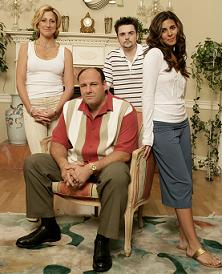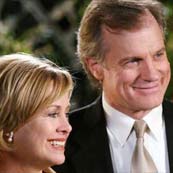 Say what you will about “The Sopranos.” Chances are that it’s already been said. In the last decade, no show has been praised more highly, examined more closely, credited with more cultural influence, or been as consistently good as “The Sopranos.” It has its detractors and its flaws, but most importantly, it has its legacy. Most of the good hour-long dramas on television today (and there are several) owe a debt of gratitude to this standard-setting show created by David Chase.
Say what you will about “The Sopranos.” Chances are that it’s already been said. In the last decade, no show has been praised more highly, examined more closely, credited with more cultural influence, or been as consistently good as “The Sopranos.” It has its detractors and its flaws, but most importantly, it has its legacy. Most of the good hour-long dramas on television today (and there are several) owe a debt of gratitude to this standard-setting show created by David Chase.
A longtime fan of mobster movies, I fell for “The Sopranos” like a snitch with cement shoes. But the core brilliance of “The Sopranos” is its depiction of gangsters who are a few murder raps shy of being everyday schmucks like you and me. And a key element of the everydayness of “The Sopranos” is the way the show handles religion: it’s there, it’s normal, and it’s inescapable.
Though the Sopranos family has a traditional Catholic heritage, most every major religion has had a spin on the show, either through a character or overt references in dialogue–Orthodox Judaism, Budddhism, Islam, and evangelical Christianity (complete with contemporary Christian rock) have all had their turn in the show’s orbit. Standard books have been issued with cringe-worthy titles like “The Gospel According to Tony Soprano” and “The Tao of Bada Bing.” But there’s no doubt that the show is interested in faith, and its characters have particular, nuanced experiences of religion.
Whether religion figures heavily into the show’s final episodes is anyone’s guess, but I, for one, will be watching this angle closely. Some lingering questions I’d like to have answers to before “The Sopranos” sleeps with the fishes:
- What does Christopher Moltisanti make of his not-quite-death-bed confession a few years back? Will faith figure into his recovery from… well, everything? Or will his lack of faith be linked to his destruction?
- Carmela Soprano can’t help it if her cooking inspires her priest to lust. But we’ve seen her as a confessor and an evangelist, someone who is drawn to faith and someone who is embittered over how faith alone cannot transform her life. Will the Church draw her in once again?
- If anyone needs to see a therapist, it’s Paulie Walnuts, who wears his crucifix faithfully, pronounces righteous judgment on others, serves his mom (until recently, anyway) with Oedipal adoration, and happily whacks anyone he can. Can anything cause Paulie to examine himself and his warped Catholicism?
- Vito Spatafore met a disgusting end in the first half of this last season–the price he paid for living as a gay mobster. His death was one time on the show when a victim’s accusers and killers were utterly convinced that God was on their side. “The Sopranos” suffered some of its weakest writing in these episodes, but I, for one, am hoping that it was a setup for a more subtle discussion of a major issue of our day. Will “The Sopranos” make anything more of homosexuality and religion?
- Finally, what will be the fate of Tony Soprano? It’s the show’s primary question, and it’s also the question most framed by questions of faith and doubt, betrayal and commitment, existential despair and longing for redemption. “The Sopranos” began when Tony Soprano decided to see a therapist. Like Dr. Jennifer Melfi, we’ve learned to regard Tony with a balance of horror and sympathy. Tony, on the other hand, has been plenty sympathetic with himself, but not plenty horrified. When Tony–or at least Tony’s character arc–meets an end, will he find redemption?
Come back when the final episode of “The Sopranos” airs, and we’ll try to make sense of how the show makes sense of religion.
Related Features:
- Quiz: Test Your Knowledge of Spirituality in “The Sopranos”
- Why I Quit “The Sopranos”
- “The Gospel According to Tony Soprano“


